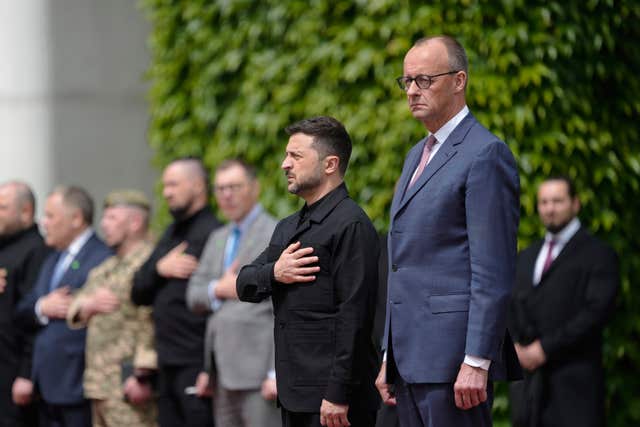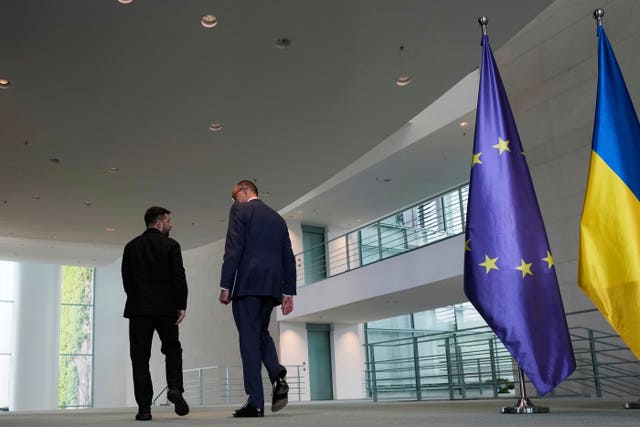German leader offers to help Ukraine develop long-range missiles to hit Russia
Ukrainian President Volodymyr Zelensky spoke to Friedrich Merz in Berlin.

German Chancellor Friedrich Merz has pledged to help Ukraine develop its own long-range missile systems that would be free of any Western-imposed limitations on their range and target options as the Kyiv government fights to repel Russia’s invasion.
Some of the advanced weapon systems that Kyiv’s Western partners have supplied to Ukraine during the more than three-year war were subject to range and target restrictions.
The limits have been a fraught political issue, stemming from fears that if the weapons struck Russia, the Kremlin might retaliate against the country that provided them and suck Nato into Europe’s biggest conflict since the Second World War.

Mr Merz said in Berlin, alongside visiting Ukrainian President Volodymyr Zelensky, that under an intensified cooperation agreement Germany “will strive to equip the Ukrainian army with all the capabilities that truly enable it to successfully defend the country”, including upgraded domestic missile production.
Germany has been the second-biggest supplier of military aid to Ukraine after the United States.
“Ukraine will be able to fully defend itself including against military targets outside its own territory” with its own missiles, Mr Merz said at a joint news conference.
The German leader’s pledge came as the past few months of intense US-led peace efforts have brought no significant breakthrough, and with analysts saying Russia is poised to launch a major summer offensive.
German foreign minister Johann Wadephul is set to meet in Washington with US secretary of state Marco Rubio later on Wednesday.
Mr Merz declined to say whether Germany will supply its advanced Taurus long-range cruise missile to Ukraine – a longstanding request by Kyiv, and a step that Berlin has resisted.
Asked about Germany’s offer to fund long-range missile production in Ukraine, Kremlin spokesman Dmitry Peskov responded that the move was an obstacle to reaching a peace agreement.
Both Mr Merz and Mr Zelensky criticized the Kremlin’s effective rejection of an unconditional ceasefire proposed by the US, which Kyiv accepted, and its delay in responding to proposals for a settlement.
Mr Merz said last Monday that Germany and other major allies were no longer imposing range limits on weapons they send to Ukraine, though he indicated their use was limited to Russian military targets.
Then-US president Joe Biden late last year authorised Ukraine to use US-supplied missiles to strike deeper into Russia.
The decision allowed Ukraine to use the Army Tactical Missile System, known as ATACMS, against Russia.
In Berlin, Mr Zelensky called for deeper defence cooperation across Europe and with the United States, stressing the need for long-range capabilities and sustained military funding to ensure Ukraine’s resilience.
“We need sufficient long-range capabilities. That’s why we must be certain of the financing of our army and the stability of Ukraine,” he said.

He added that the cooperation projects already exist. “We simply want (the missiles) to be produced in the quantity we need,” Mr Zelensky told the news conference.
On Tuesday, the Ukrainian President said he is ready to hold peace talks at the highest level, including a trilateral meeting with himself, Russian leader Vladimir Putin and US President Donald Trump.
“We are ready to meet at the level of leaders. Both the American side knows this, and the Russian side knows this,” he said.
Mr Zelensky said he would accept any configuration of talks, whether that includes one trilateral meeting or separate meetings with Trump.
Mr Peskov, the Kremlin spokesman, said that Russia is grateful to Trump for his mediation efforts.
“At the same time, there is a big number of nuances to be discussed that can’t be neglected and which neither party is going to sacrifice, because of its national interests,” Peskov told reporters.
“Just like the United States, Russia has its national interests that are of primary importance to us.”
He said that Moscow will “soon” deliver its promised memorandum on a framework for a peace settlement.
Meanwhile, fighting has continued along the roughly 620-mile front line, where Ukraine’s army is shorthanded against its bigger adversary.
Mr Zelensky claimed Russia is mobilising up to 45,000 men every month, while Ukraine mobilises between 25,000-27,000.
Both sides are continuing to conduct deep strikes. Russia launched its biggest drone attack of the war against Ukraine on Sunday.
Russian air defences downed 296 Ukrainian drones over 13 Russian regions late on Tuesday and early Wednesday, Russia’s defence ministry said, in what appeared to be one of the biggest Ukrainian drone assaults of the war.





